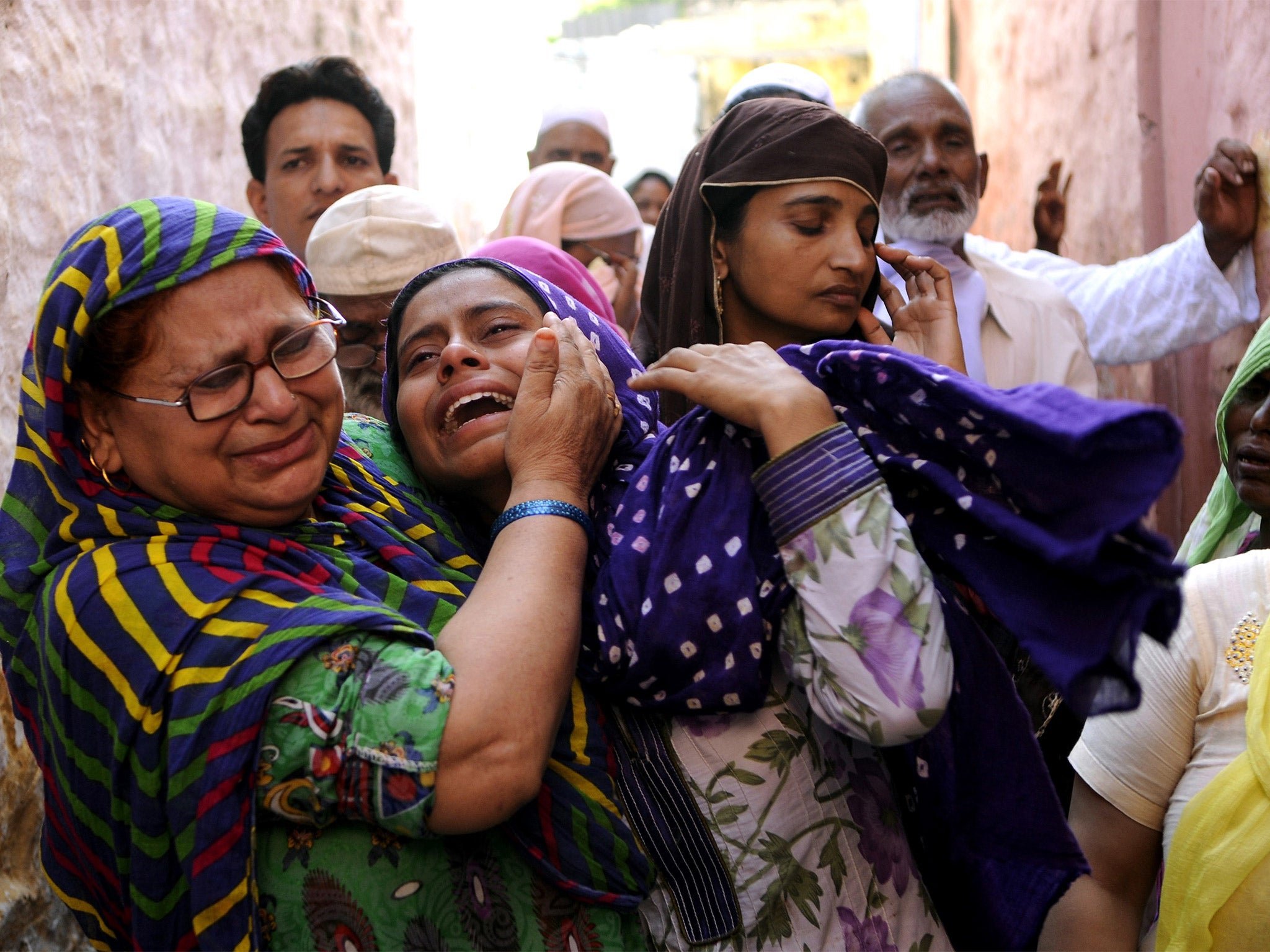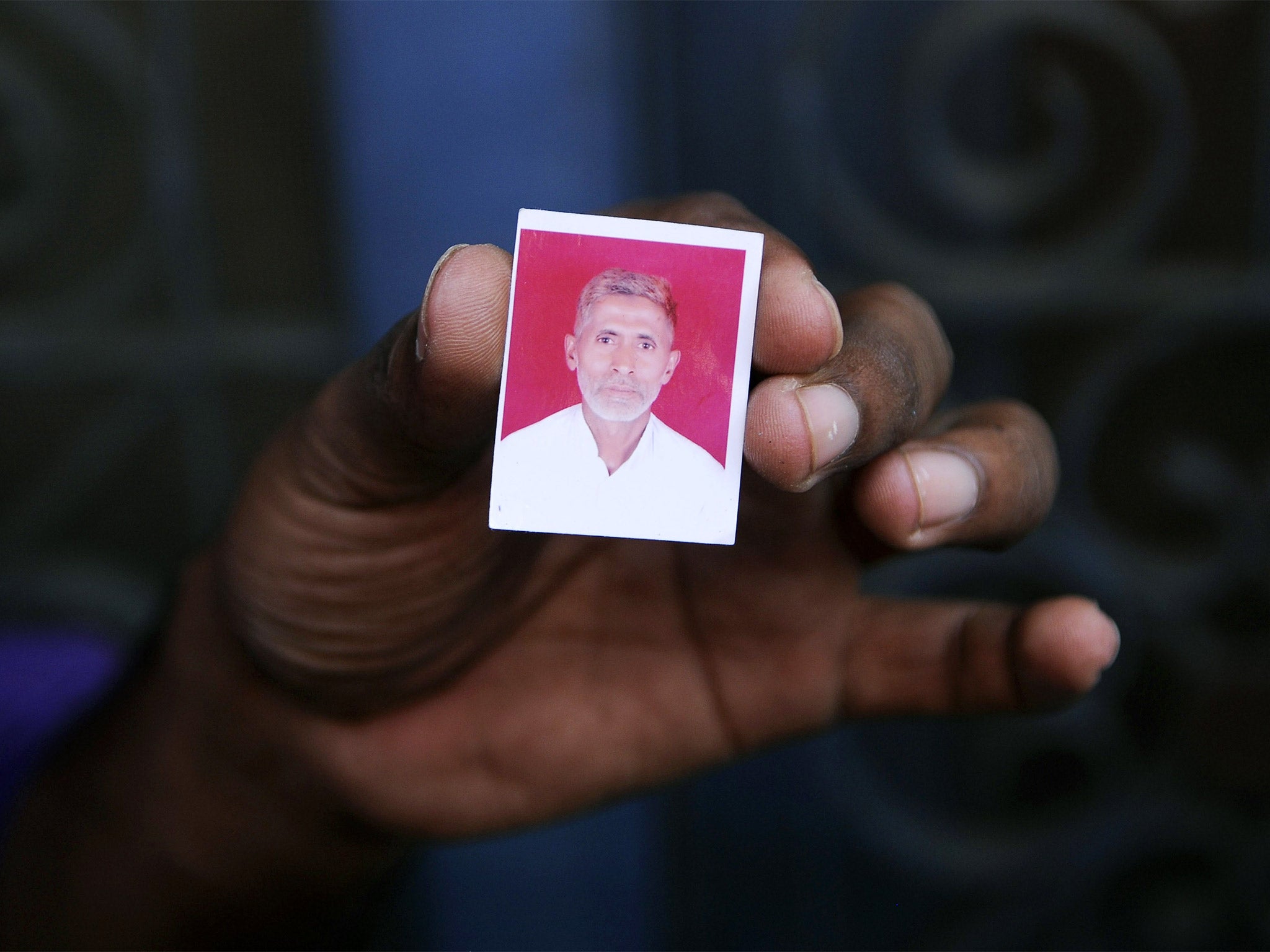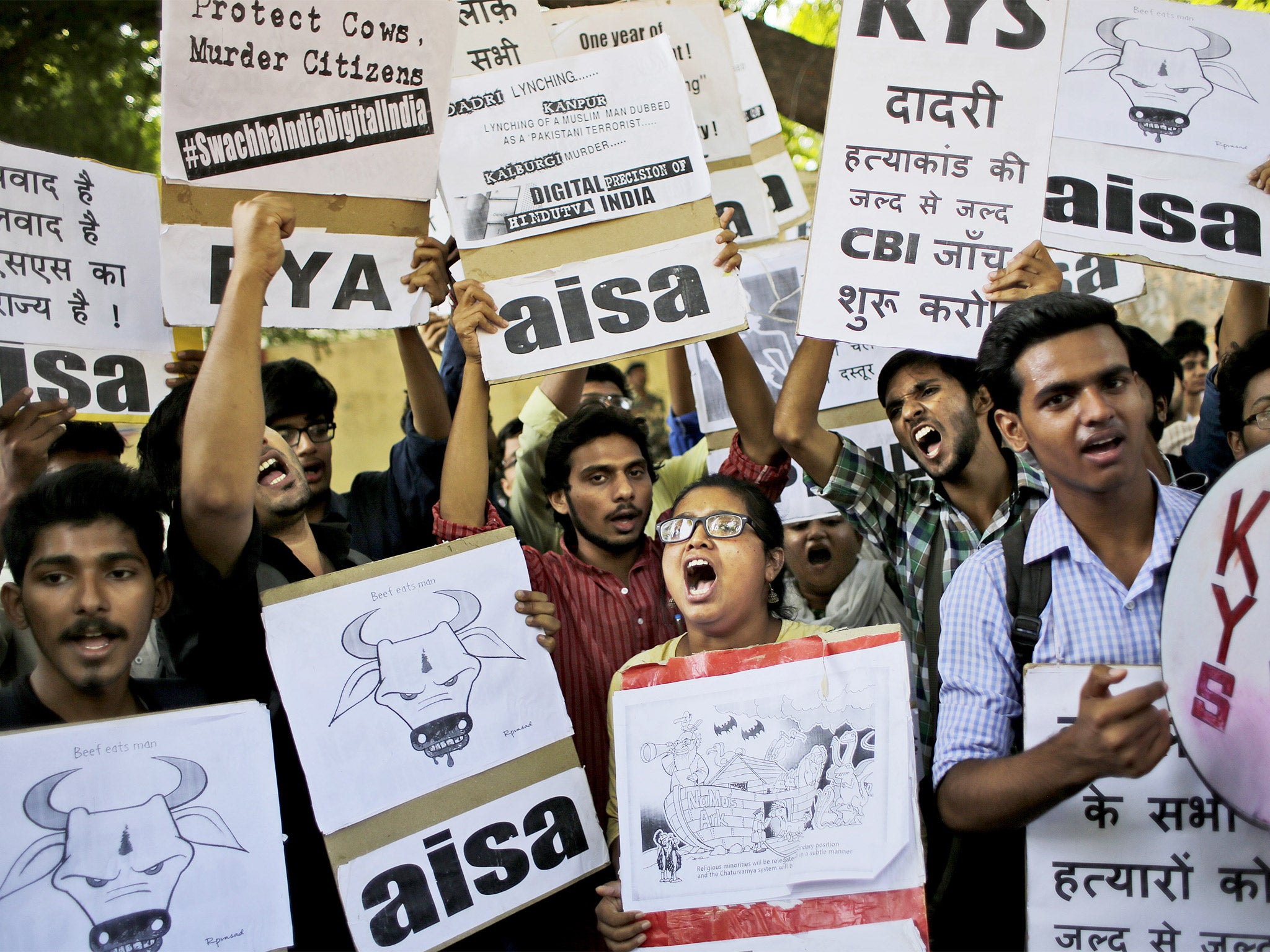India PM Narendra Modi facing calls to condemn Hindu mob that killed Muslim man for slaughtering sacred cow
The murder has provoked fears of sectarian violence – but barely a word from the Hindu nationalist government’s leader

The killing of a Muslim blacksmith by a Hindu mob for supposedly slaughtering and eating a sacred cow has fuelled fears of growing religious intolerance under the government of the Indian Prime Minister Narendra Modi.
In a country proud of its secular foundations, pressure is now mounting on Mr Modi to break his silence over the death of 50-year-old Mohammed Akhlaq, as the row has escalated and embroiled several members of his Hindu-nationalist Bharatiya Janata Party (BJP).
Mr Akhlaq was dragged out of his home last week and beaten to death with bricks in the village of Bisara, 50 kilometres from the capital Delhi, after rumours spread that he had killed and eaten a cow – an animal revered by many Hindus. One of his sons is still being treated in hospital for serious head injuries.

The slaughter of cows has become an increasingly politicised issue in India since the BJP swept to power last year, with the party tightening rules in several states under its control to protect the animal.
Hardliners from the Hindu majority have pitted themselves against largely poor Muslims, who dominate the cattle trade and rely on cheap meat as a key component of their diet. Politicians of all stripes have descended on Bisara, located in India’s most populous state of Uttar Pradesh where cow slaughter has long been banned, ahead of local elections in neighbouring Bihar beginning next week.
But it is BJP members who have been at the centre of accusations ranging from fanning communal tensions in the area, having links to the main suspects in the attack and making inflammatory comments in the aftermath of the killing. “We won’t remain silent if somebody tries to kill our mother,” said the BJP politician Sakshi Maharaj in comments broadcast on the CNN-IBN news channel. “We are ready to kill and get killed,” he said.
The local MP and Culture Minister, Mahesh Sharma, who previously courted controversy by praising India’s former President Abdul Kalam for his contributions “despite being a Muslim”, initially described Mr Akhlaq’s killing as an “accident”.
Another BJP politician, Sangeet Som, warned of a “befitting reply” if innocent people were found to have been framed for the murder. Police have arrested eight people in connection with the attack.

Although the home ministry expressed concern over the incident and the President has called for tolerance and plurality to be upheld, Mr Modi has maintained a conspicuous silence over the killing.
Growing ranks of critics have expressed their disbelief that he is yet to intervene on an issue gripping the nation and condemn or even distance himself from comments made by members of his party.
“The blame for this has to fall entirely on Modi. Those who spread this poison enjoy his patronage,” wrote Pratap Bhanu Mehta, who heads the influential Centre for Policy Research, in The Indian Express newspaper.
The acclaimed Indian writer Nayantara Sahgal, niece of the country’s first Prime Minister Jawaharlal Nehru, handed back a prestigious government literary award, citing Mr Modi’s failure to speak up in a climate of rising intolerance. Mr Modi has been accused of not doing enough to stop Hindu-Muslim riots in 2002 in Gujarat when he was chief minister of the state, allegations which he has always strongly denied.
Tensions in Bisara are still running high, with a ban in place on groups assembling and religious figures being denied entry to the village. Some Muslim leaders have claimed the killing was pre-meditated and caused by local Hindu-nationalist activists polarising the community.
They criticised officials for prioritising sending a sample of meat collected from the Akhlaq family home for testing, to establish whether or not it was beef, instead of focusing on the murder investigation. The Akhlaq family have questioned why they were targeted and maintain they had only been storing mutton.
“I am appealing to all for harmony. This is not the time for politics,” Sartaj Akhlaq, son of the dead man who was not present at the time of the attack, told the local channel NDTV. A corporal in the Indian air force, Mr Akhlaq has promised to relocate his family to Chennai where he is based.
Since Mr Modi’s government came to power, the rhetoric surrounding protection of cows has stepped up. A BJP coalition government in Maharashtra state, home to the financial capital Mumbai, imposed a total beef ban earlier this year, prompting widespread condemnation. Several government leaders have called for a nationwide prohibition.
India is the world’s fifth-biggest consumer of beef and its largest exporter, although most of this meat comes from buffalo. The government has begun cracking down on the established practice of smuggling cows out of India into Bangladesh and has announced new testing facilities at ports to ensure only buffalo meat was being sent abroad.
Sacred cows: A symbol of gentleness
The respect shown to cows by Hindus is symbolic of their view that all living things are sacred. As a result of this belief, some Hindus are vegetarians, while many of those who eat meat will not eat beef.
Mahatma Gandhi, quoted by Hinduism Today magazine, once said: “One can measure the greatness of a nation and its moral progress by the way it treats its animals. Cow protection to me is not mere protection of the cow. It means protection of all that lives and is helpless and weak in the world. The cow means the entire subhuman world.”
The cow is said to symbolise virtues, including non-violence, gentleness, dignity, strength and selfless service.
Ian Johnston
Join our commenting forum
Join thought-provoking conversations, follow other Independent readers and see their replies
Comments